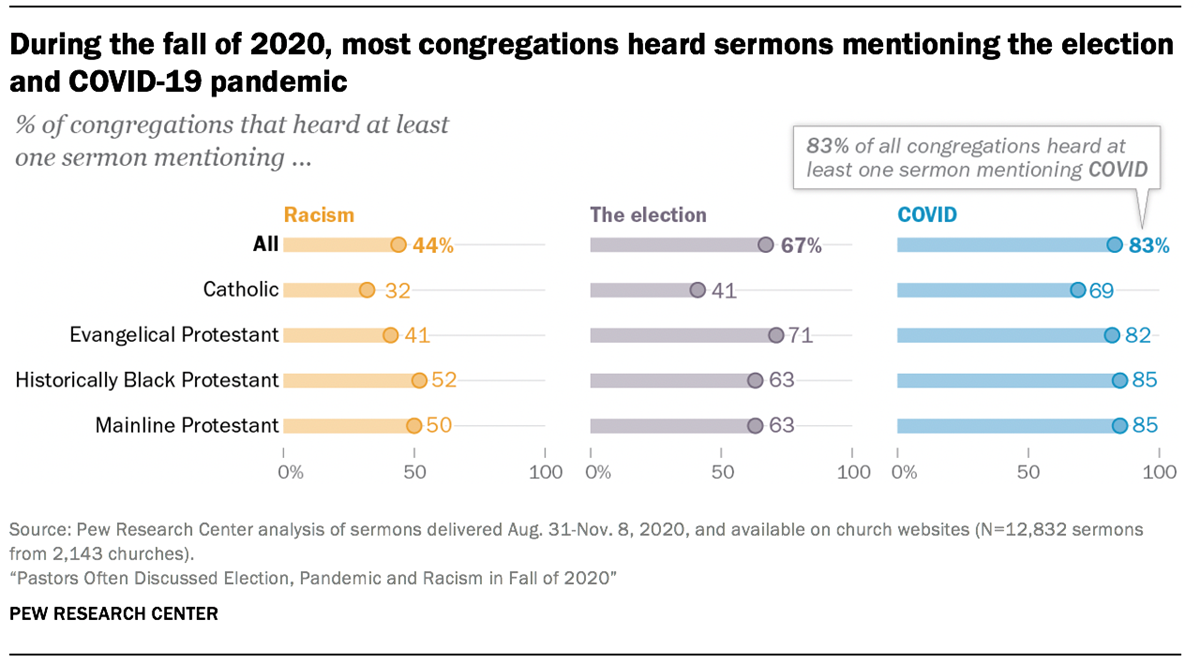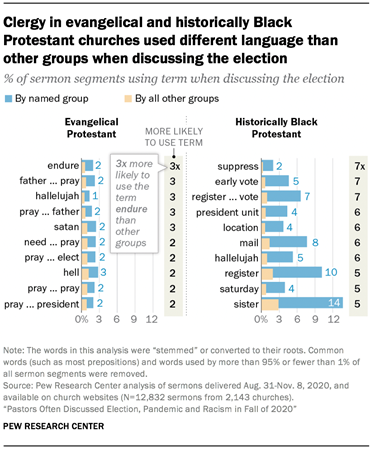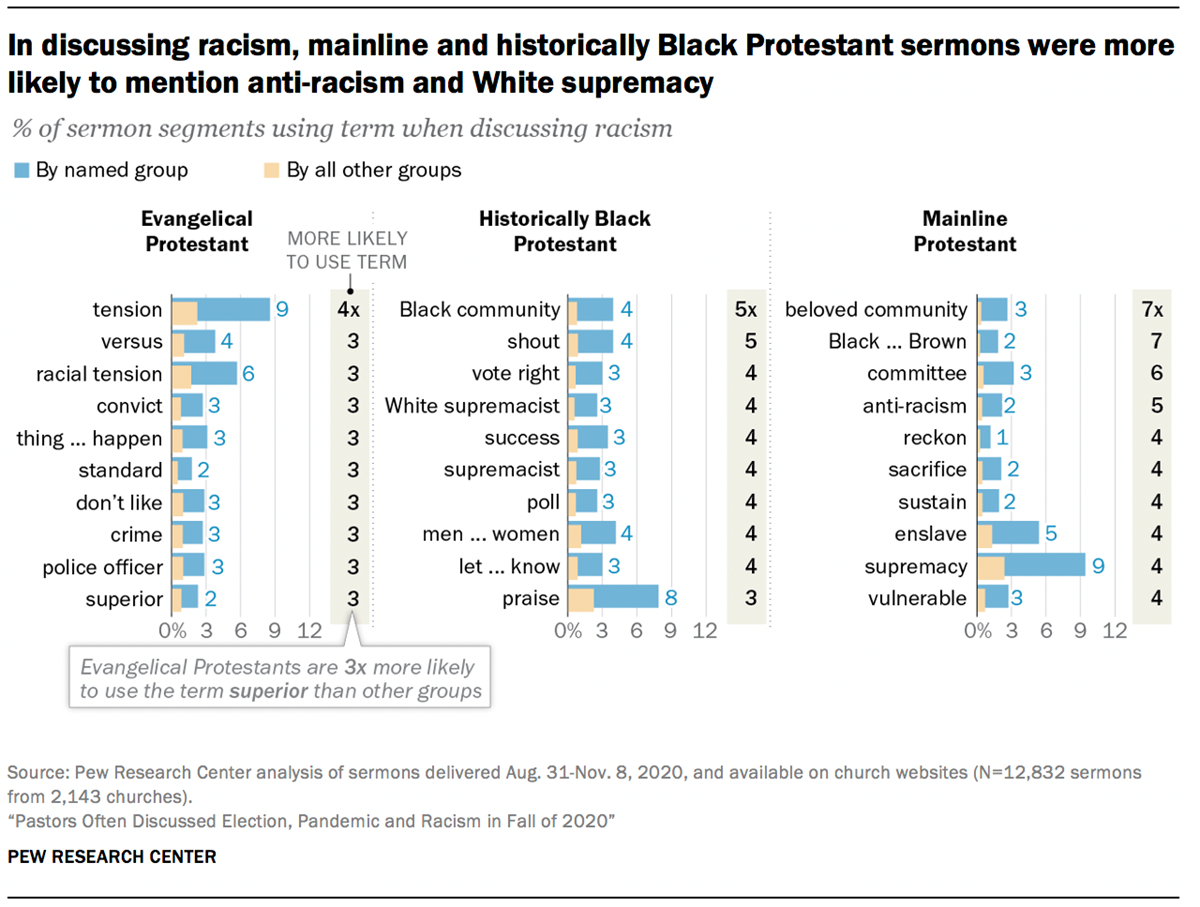
The stories that shaped Americans’ lives in 2020—the pandemic, the presidential election, and the reckoning over racial violence—also made their way into a majority of sermons last fall, according to Pew Research Center analysis of 12,832 messages posted on church websites.
But whether your pastor preached about praying for the president or registering to vote, or the sermon referred to “racial tensions” or “white supremacy,” depended on the kind of church you attended.
Overall, Protestants were significantly more likely than Catholics to address current events from the pulpit. And the spiritual framing differed between evangelical Protestants and Protestants from historically Black traditions, though the majority of Black Protestants share evangelical beliefs.
Over 80 percent of evangelical and Black Protestant churches heard sermons around COVID-19, while 71 percent of evangelical and 63 percent of Black Protestant churches addressed the election, and 41 percent of evangelical and 52 percent of Black Protestant pastors preached on racism.
Like many pastors across the country, R. Derrick Parks at Epiphany Church in Wilmington, Delaware, spent 15 months delivering his Sunday messages to a camera while his 100-person church paused in-person services during the pandemic.
An African American and the executive coordinator of Acts 29’s urban church planting, Parks said that during this time, he heard responses from congregants who were “encouraged when we directly spoke to issues of justice”—a regular theme in his preaching and in Scripture.
Months after the deaths of Ahmaud Arbery, Breonna Taylor, and George Floyd stirred protests in major cities, racism continued to come up in 44 percent of the sermons analyzed by Pew in a roughly two-month period last fall.

Black Protestant churches were more likely than any other tradition to preach on racism. Both in sermons addressing race and addressing the election, they were also more likely to address voting rights.
Sermons from Black Protestants in the Pew analysis were twice as likely to encouraging voting when talking about the election (43% vs. 20% overall), while evangelicals were more likely than other traditions to speak on issues, candidates, or parties (48%).
“I just see it as a Christian responsibility for us to engage the needs of our communities. It’s always been about the community as a whole. Churches exist to proclaim the name of Jesus to those who are lost and at the same time to leave his imprint in whatever community they end up in,” said Parks. “The Black church has been a beacon of that. If that meant we’re going to rally people to a voting booth, we’re going to do that.”
Previous research from Pew found that Black Protestants and evangelicals are the only major religious traditions that want their churches to “express their views” on social and political issues. The majority of Black Protestants want to see faith have a greater influence on politics, but different churches have different approaches.
“African American Protestant churches have varied orientations towards politics in the pulpit,” said Lerone A. Martin, associate professor in religion and politics at Washington University in St. Louis. “Some are very politically engaged while others, especially those in the holiness and Pentecostal traditions often stay away from politics, instead choosing to focus on individual holiness and piety.”
“The blatant racism of the Trump administration was the final straw for some Black Christians,” Martin said, “pushing some Black faith committed towards more explicit political engagement and even departing majority white denominations and churches.”

Protestants at historically Black churches were seven times more likely to hear a sermon reference voter suppression, early voting, and registering to vote, according to Pew.
Evangelical churches, by contrast, spoke more regularly of prayer for the election and for the president. The Pew report noted, “evangelical pastors tended to employ language related to evil and punishment at a greater rate, using words and phrases such as ‘Satan’ or ‘hell’ at least twice as often as other clergy did.”
When addressing racism, evangelical pastors were more likely to refer to “racial tension” or mention the role of the police, while Black and mainline Christians spoke more often of “white supremacy.”

Other surveys found that Protestant pastors overall became more reluctant to preach on race in recent years. Lifeway Research reported earlier this year that while the majority of pastors are open to preaching on racial reconciliation and had done so in the past two years, higher numbers have received significant pushback for their messages on race.
For years, pastors have sensed a growing expectation that they address current events from the pulpit, especially as certain news stories dominate social media feeds.
Most pastors see the purpose of their preaching as proclamation of the gospel above all, but also recognize the opportunity to equip their flock to think biblically about the world around them.
“A faithful preacher is always addressing events that are current. They’re always seeking to speak in manner that allows the Word of God to apply to people’s everyday lives,” said Delaware pastor R. Derrick Parks.
“I believe that in moments of crisis you should respond and not react... We responded to the issue of justice with thoughtful care and used the one tool that is the primary tool for us, and that’s the Word of God.”

Support Our Work
Subscribe to CT for less than $4.25/month




















